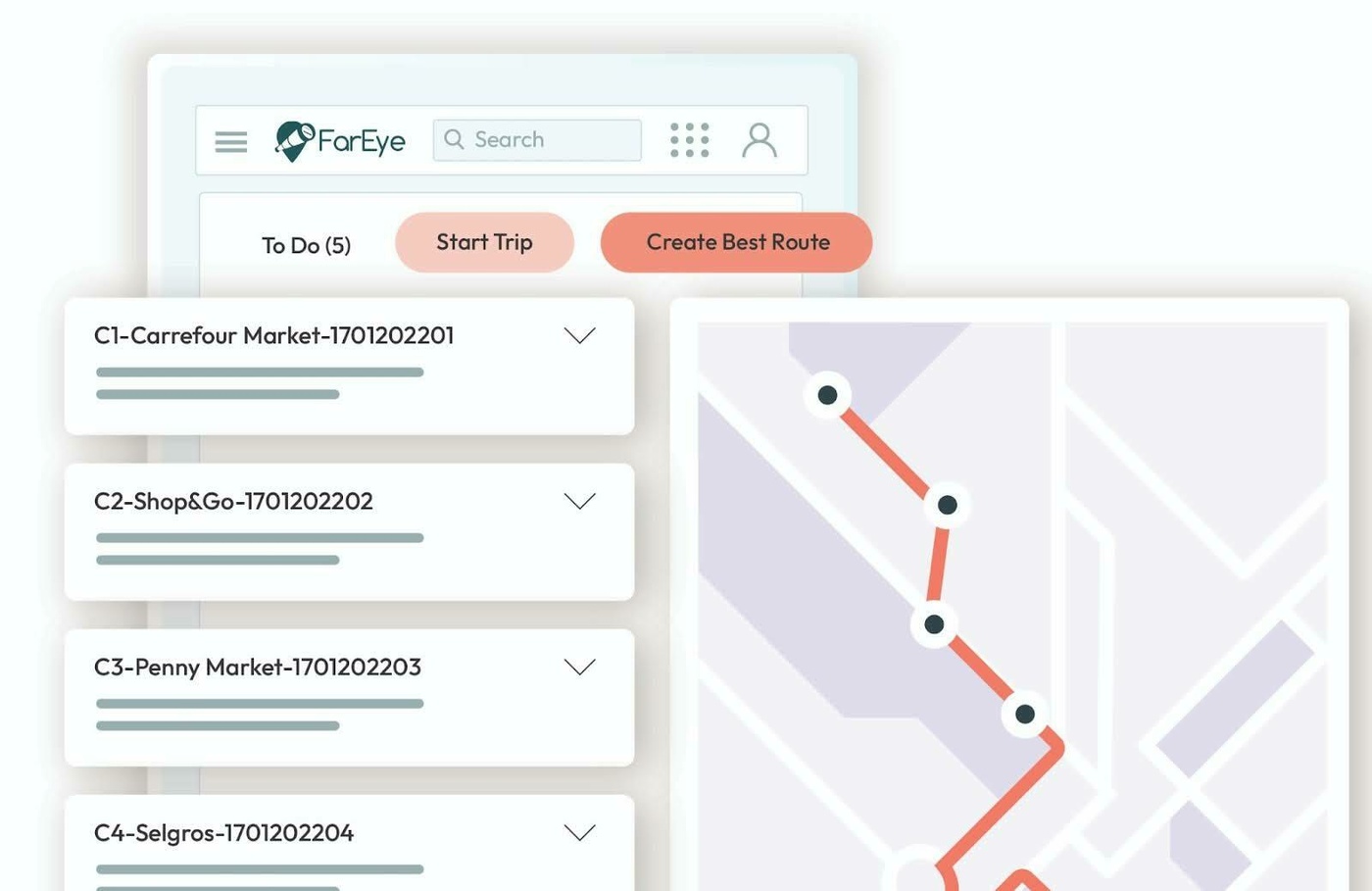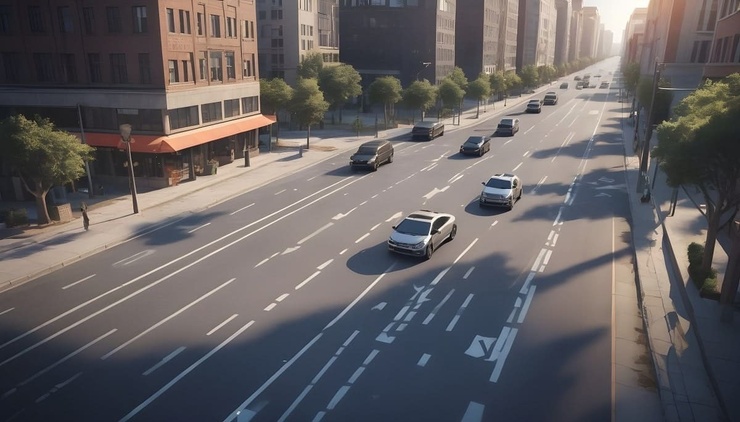- Route
Dynamic Route Planning That Keeps Deliveries Moving in Urban Areas
Efficient delivery operations are critical in today’s fast-evolving urban landscapes, where over 55% of the global population resides in cities. With urbanization accelerating, the pressure to meet rising delivery demands while navigating congested streets and complex logistics networks has never been greater.
The last-mile delivery market alone is expected to reach $258.68 Billion By 2030, driven by increasing consumer expectations for speed and precision. Dynamic route planning is no longer a luxury but a critical operational strategy for enterprises to stay competitive in urban areas.

Let’s explore the intricacies of dynamic route planning, highlighting its necessity, challenges, and how enterprises can leverage it to drive efficiency and sustainability in urban deliveries.
Understanding Dynamic Route Planning
Dynamic route planning involves real-time optimization of delivery routes using advanced technologies that consider live data such as traffic conditions, weather updates, and order modifications. Further, it adapts to evolving conditions to ensure seamless operations.
Core principles of dynamic route planning:
- Real-Time Adjustments: Adjusts routes dynamically based on immediate variables like road closures and traffic density.
- Data-Driven Insights: Leverages inputs from GPS systems, customer updates, and operational data for decision-making.
- Multi-Constraint Planning: Accounts for delivery time windows, vehicle capacity, driver schedules, and regulatory requirements.
- Sustainability: Optimizes routes to reduce fuel consumption and emissions.
Dynamic routing bridges the gap between operational efficiency and customer satisfaction, making it indispensable for enterprises in urban logistics.
Addressing Urban Delivery Challenges with Dynamic Routing
- Congestion and Traffic Delays
Urban areas are often plagued by heavy traffic, which disrupts timely delivery schedules. According to a report, businesses lose $88 billion annually in the U.S. alone due to traffic-related delays.
Dynamic routing mitigates these delays by rerouting vehicles in real time, ensuring timely deliveries while reducing idle times. - High Order Volumes and Last-Mile Complexity
The surge in e-commerce has amplified last-mile delivery complexities. Handling bulk orders efficiently requires advanced systems to prevent bottlenecks.
Dynamic routing prioritizes deliveries, balances workloads, and streamlines sequencing, enabling enterprises to meet high order volumes without compromising service quality. - Underutilized Resources
Inefficient planning often results in partially loaded vehicles, increasing operational costs. Dynamic routing optimizes vehicle capacity utilization by co-mingling loads and sequencing stops effectively. - Adaptability to Dynamic Changes
Unforeseen disruptions like order cancellations or urgent requests can derail delivery plans. Dynamic routing accommodates these changes in real time, enabling an agile and customer-first delivery ecosystem. - Pressure for Sustainability
Enterprises face growing demands to adopt eco-friendly practices. Dynamic routing minimizes unnecessary miles and supports green delivery initiatives, helping businesses align with sustainability goals.
Key Elements of Dynamic Route Planning
- AI-Powered Optimization
Artificial intelligence (AI) enhances dynamic routing by analyzing historical and real-time data to predict traffic patterns, optimize routes, and improve delivery efficiency. AI-driven tools and proprietary algorithms can process constraints like time windows, vehicle types, and customer preferences seamlessly. - Geocoding and Geofencing
Geocoding ensures accurate address mapping, while geofencing creates virtual perimeters around delivery zones. These tools prevent unauthorized detours and improve delivery accuracy. - Multi-Constraint Scheduling
Dynamic routing systems incorporate multiple parameters, including:- Vehicle Constraints: Capacity, fuel efficiency, and EV charging needs.
- Order Requirements: Delivery windows, priority orders, and specific handling instructions.
- Driver Variables: Working hours, skills, and compliance with regulations like DoT.
- Integration with Existing Systems
Dynamic routing solutions must integrate seamlessly with operational tools like order management systems (OMS) and transportation management systems (TMS). FarEye’s plug-and-play API enables instant route generation tailored to enterprise needs. - Hybrid Route Planning
Combining static and dynamic routing elements allows enterprises to manage routine deliveries while adapting to real-time changes. For instance, static plans can handle regular deliveries, while dynamic adjustments cater to same-day or on-demand orders.
FarEye: The Ultimate Solution for Dynamic Route Planning
FarEye’s platform offers a comprehensive approach to dynamic routing, designed to address urban delivery challenges through advanced features and tailored solutions.
Core functionalities:
- Real-Time Dynamic Optimization:
FarEye’s algorithms can generate optimized routes for high volumes, handling 50,000+ orders with 10+ constraints in minutes. This capability ensures timely deliveries even during peak demand periods. - Tailored Routing Solutions
- LTL/FTL Routing: Optimizes multi-day hauls by factoring in load co-mingling, time windows, and freight costs.
- Parcel Routing: Handles same-day and next-day deliveries with precision, incorporating constraints like geofencing and delivery time slots.
- Hyperlocal Planning: Improves fleet utilization and enables on-demand deliveries with dynamic driver allocation.
- Scheduled Routing: Offers flexibility with green delivery windows, improving first-attempt success rates.
- Sustainability Features
FarEye promotes eco-friendly logistics by supporting EV-compatible routing and prioritizing green delivery windows to reduce carbon footprints. - Scalability and Integration
The platform integrates seamlessly with existing OMS and TMS systems, providing scalable solutions tailored to enterprise needs.
Benefits of Adopting Dynamic Route Planning
- Operational Efficiency
Dynamic routing reduces planning times and ensures vehicles take the most efficient paths, saving time and fuel. - Enhanced Delivery Accuracy
Real-time updates ensure accurate ETAs, reducing failed deliveries and reattempts. - Cost Savings
By optimizing routes, dynamic routing lowers transportation and fuel expenses while maximizing driver productivity. - Improved Customer Experience
Dynamic routing enhances customer satisfaction by adhering to delivery promises and providing live tracking updates. - Sustainability Alignment
Eco-friendly routing supports corporate sustainability initiatives, reducing emissions and promoting green logistics.
The Road Ahead
Dynamic route planning is an indispensable tool for enterprises navigating the complexities of urban deliveries. By leveraging advanced technologies like AI and real-time data, businesses can overcome operational challenges, optimize resources, and enhance delivery performance. FarEye’s cutting-edge solutions provide the scalability, efficiency, and sustainability required to thrive in today’s competitive logistics landscape.
Embrace the future of urban logistics with FarEye’s dynamic routing platform—your partner in driving efficiency and excellence. Schedule a demo today to transform your delivery operations.

Komal Puri is a seasoned professional in the logistics and supply chain industry. As the AVP of Marketing and a subject matter expert at FarEye, she has been instrumental in shaping the industry narrative for the past decade. Her expertise and insights have earned her numerous awards and recognition. Komal’s writings reflect her deep understanding of the industry, offering valuable insights and thought leadership.
Let's Talk to Our Experts and Optimize Your Deliveries Today!
An expert from our team will reach out within 24 hours



